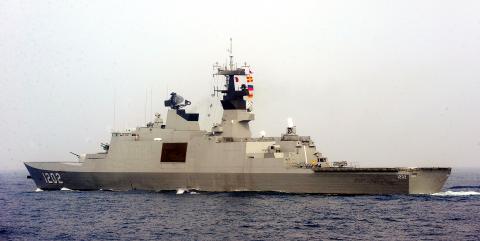Less than two years after winning a landmark 630 million euro (US$875 million) lawsuit against a French defense contractor over the scandal-plagued sale of Lafayette-class frigates to Taiwan in the 1990s, an arbitration court last week shot down Taipei’s hopes for a second win in a related case, citing a lack of evidence.
In its follow-up claim, Taipei had filed claims of 45.5 million euros, including interests and prosecution fees, against DCNS, the maker of the frigates, over a 1996 spares supply contract for the six multi-role stealth frigates.
A Basic Ordering Agreement signed on May 20, 1996, stipulated that Taiwan would be entitled to a 15 percent reduction if French agents were caught paying commissions to middlemen.

Photo: Chang Chia-ming, Taipei Times
However, an arbitration tribunal under the International Chamber of Commerce cut the compensation to 3 million euros, citing a lack of evidence to support Taiwan’s full claims against DCNS, then a state-owned entity known as Direction de Constructions Navales, Defense News reported.
The Ministry of National Defense had set aside NT$75 million (US$2.6 million) in this year’s defense budget to fund the new litigation, which it filed on Oct. 12 last year.
The ruling follows a similar one handed down on June 9 last year, in which Thales, a company then known as Thomson-CSF, which supplied the electronics on the frigates, and the French government were ordered to pay Taiwan 170 million euros and 460 million euros respectively for illegal kickbacks and commissions in the initial US$2.8 billion Bravo deal signed in 1991.
Aside from hampering access to critical technologies to Taiwan, the Lafayette scandal also claimed the life of Yin Ching-feng (尹清楓), a naval captain who is believed to have been murdered in December 1993 as he was about to blow the whistle on colleagues who were receiving kickbacks in the deal.
Thomson-CSF’s agent in Taiwan, Andrew Wang (汪傳浦), fled the country soon after Yin’s body was found floating near Suao (蘇澳).

A preclearance service to facilitate entry for people traveling to select airports in Japan would be available from Thursday next week to Feb. 25 at Taiwan Taoyuan International Airport, Taoyuan International Airport Corp (TIAC) said on Tuesday. The service was first made available to Taiwanese travelers throughout the winter vacation of 2024 and during the Lunar New Year holiday. In addition to flights to the Japanese cities of Hakodate, Asahikawa, Akita, Sendai, Niigata, Okayama, Takamatsu, Kumamoto and Kagoshima, the service would be available to travelers to Kobe and Oita. The service can be accessed by passengers of 15 flight routes operated by

Alain Robert, known as the "French Spider-Man," praised Alex Honnold as exceptionally well-prepared after the US climber completed a free solo ascent of Taipei 101 yesterday. Robert said Honnold's ascent of the 508m-tall skyscraper in just more than one-and-a-half hours without using safety ropes or equipment was a remarkable achievement. "This is my life," he said in an interview conducted in French, adding that he liked the feeling of being "on the edge of danger." The 63-year-old Frenchman climbed Taipei 101 using ropes in December 2004, taking about four hours to reach the top. On a one-to-10 scale of difficulty, Robert said Taipei 101

Taiwanese and US defense groups are collaborating to introduce deployable, semi-autonomous manufacturing systems for drones and components in a boost to the nation’s supply chain resilience. Taiwan’s G-Tech Optroelectronics Corp subsidiary GTOC and the US’ Aerkomm Inc on Friday announced an agreement with fellow US-based Firestorm Lab to adopt the latter’s xCell, a technology featuring 3D printers fitted in 6.1m container units. The systems enable aerial platforms and parts to be produced in high volumes from dispersed nodes capable of rapid redeployment, to minimize the risk of enemy strikes and to meet field requirements, they said. Firestorm chief technology officer Ian Muceus said

MORE FALL: An investigation into one of Xi’s key cronies, part of a broader ‘anti-corruption’ drive, indicates that he might have a deep distrust in the military, an expert said China’s latest military purge underscores systemic risks in its shift from collective leadership to sole rule under Chinese President Xi Jinping (習近平), and could disrupt its chain of command and military capabilities, a national security official said yesterday. If decisionmaking within the Chinese Communist Party has become “irrational” under one-man rule, the Taiwan Strait and the regional situation must be approached with extreme caution, given unforeseen risks, they added. The anonymous official made the remarks as China’s Central Military Commission Vice Chairman Zhang Youxia (張又俠) and Joint Staff Department Chief of Staff Liu Zhenli (劉振立) were reportedly being investigated for suspected “serious